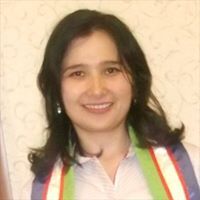Racializing locals has been one of the main characteristics of Russian and Soviet imperial modernity. Anbar Otin (1870–1915) was among the thinkers and writers in Turkistan’s Muslim society engaging with such issues. In Risolai Falsafai... more
Racializing locals has been one of the main characteristics of Russian and Soviet imperial modernity. Anbar Otin (1870–1915) was among the thinkers and writers in Turkistan’s Muslim society engaging with such issues. In Risolai Falsafai Siyohon (The Treatise on the Philosophy of the Blacks) she treats siyohon (blacks) as a color employed as a social metaphor and social position used in reference to the ordinary people of Turkestan, their frustrated hopes, and their pain. In the work, Anbar indicates that the word siyohon (qoralar -blackness) has been used to racialize, discriminate against, and denigrate Turkestan’s peoples. According to Anbar, it also carries a positive connotation as in “inner and physical beauty.” In this paper, I analyze the writing of Anbar in relation to her understanding of racialization, inequality, religion, gender, and disability, situating Anbar’s experience within broader discussions of such topics in the Central Asian context.
Elder care is increasingly important in every society. In most of the world, a female relative performs elder care at home. Nevertheless, as wives, daughters, and daughters-in-law gain access to birth control, late marriage, education,... more
Elder care is increasingly important in every society. In most of the world, a female relative performs elder care at home. Nevertheless, as wives, daughters, and daughters-in-law gain access to birth control, late marriage, education, migration, and paid labor, they become less available for unpaid and underappreciated elder caregiving. Patriarchal cultures based on multi-generational families often use daughters-in-laws as elder caregivers. When these families are Muslims, they sometimes seek out Islamic law in support of this elder care strategy. Muslims often maintain that one of Islam’s contributions to world religions is its emphasis on women’s rights; and that one of Islamic law’s great attributes is how it encourages Muslims to reject tribal practices in favor of a universal Islamic community existing under a single law. If both these claims are true, Islamic law should oppose culturally appealing local elder care practices that undercut female autonomy. This article uses mo...
reference#references_tab_contents You may need to log in to JSTOR to access the linked references. JSTOR is a not-for-profit service that helps scholars, researchers, and students discover, use, and build upon a wide range of content in a... more
reference#references_tab_contents You may need to log in to JSTOR to access the linked references. JSTOR is a not-for-profit service that helps scholars, researchers, and students discover, use, and build upon a wide range of content in a trusted digital archive. We use information technology and tools to increase productivity and facilitate new forms of scholarship. For more information about JSTOR, please contact support@jstor.org.
Research Interests:
Research Interests:
Influenced by Arabic and Persian traditions, the plural word Ādāb in the Uzbek language (sing. adab) as a social term connotes a discipline of character development in ethics and morals. As a literary term, adab means a concept of... more
Influenced by Arabic and Persian traditions, the plural word Ādāb in the Uzbek language (sing. adab) as a social term connotes a discipline of character development in ethics and morals. As a literary term, adab means a concept of aesthetics that teaches morality. The prevalence of the concept in Uzbek society is evidenced by the fact that there is a school subject called Odobnoma: adab studies. These elementary-school classes aim to cultivate moral uprightness, social responsibility and virtue. On the surface , the subject seems to be secular, yet a closer analysis of the themes and topics of Odobnoma reveals indirect Islamic influence. This is partly because Central Asian cultures contain Islamic teachings, which have become a part of the national understanding of morality, ethics and etiquette. This article explores the influence of these teachings from the Uzbek perspective of " national character. "
Keywords Odobnoma – national character – moral education – adab – Uzbekistan
Keywords Odobnoma – national character – moral education – adab – Uzbekistan
